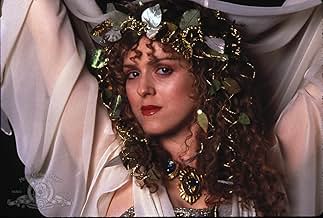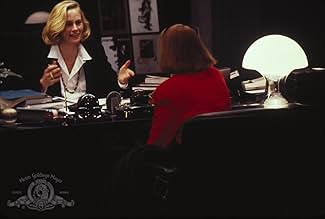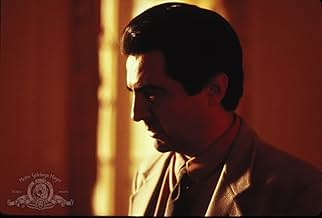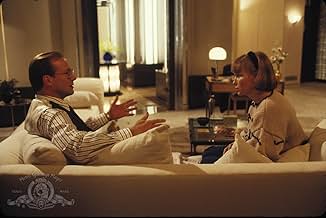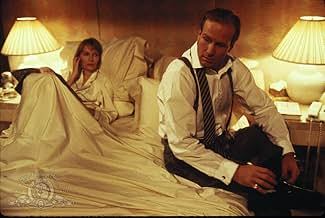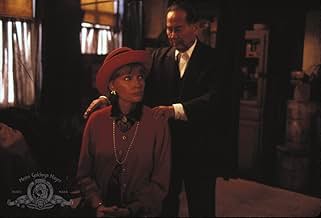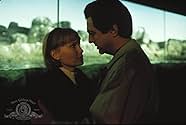A spoiled Manhattan housewife re-evaluates her life after visiting a Chinatown healer.A spoiled Manhattan housewife re-evaluates her life after visiting a Chinatown healer.A spoiled Manhattan housewife re-evaluates her life after visiting a Chinatown healer.
- Nominated for 1 Oscar
- 1 win & 7 nominations total
Matthew H. Williamson
- Dennis
- (as Matt Williamson)
- Director
- Writer
- All cast & crew
- Production, box office & more at IMDbPro
Featured reviews
When I first saw Alice, I didn't know it was a Woody Allen movie, but I can imagine if I'd been expecting the usual stammering joke fest, I might have wondered where Woody's influence went. He doesn't always make strict comedies, though, and this movie proves it.
Mia Farrow and William Hurt are married, have two children, and live the high-life. But Mia, in the title role, is unsatisfied and she doesn't know why. She visits a Chinese acupuncturist to help with some back pain and enters a journey of self-discovery.
Mia does a wonderful job in this slightly off-beat flick. Just as in The Purple Rose of Cairo when she rises above an unhappy marriage and finds herself, she expresses curiosity, sadness, hope, and invigoration all at the right times. I happen to be a Mia Farrow fan, so I was expecting to like this movie, but my mom doesn't like her nearly as much as I do, and she still really enjoyed Alice. As always in Woody Allen movies, there's a large cast, and this one includes Alec Baldwin, Blythe Danner, Cybill Shepherd, Joe Montegna, June Squibb, Julie Kavner, Bernadette Peters, Gwen Verdon, and Bob Balaban. Alice is thoughtful and sweet, and a great movie to watch when you're pondering the universe.
Mia Farrow and William Hurt are married, have two children, and live the high-life. But Mia, in the title role, is unsatisfied and she doesn't know why. She visits a Chinese acupuncturist to help with some back pain and enters a journey of self-discovery.
Mia does a wonderful job in this slightly off-beat flick. Just as in The Purple Rose of Cairo when she rises above an unhappy marriage and finds herself, she expresses curiosity, sadness, hope, and invigoration all at the right times. I happen to be a Mia Farrow fan, so I was expecting to like this movie, but my mom doesn't like her nearly as much as I do, and she still really enjoyed Alice. As always in Woody Allen movies, there's a large cast, and this one includes Alec Baldwin, Blythe Danner, Cybill Shepherd, Joe Montegna, June Squibb, Julie Kavner, Bernadette Peters, Gwen Verdon, and Bob Balaban. Alice is thoughtful and sweet, and a great movie to watch when you're pondering the universe.
This movie is Mia Farrow's most magical moment. She glows in this film and as Woody Allen doesn't appear in it, and the film is not a heavy drama like Interiors or Another Woman, it will appeal to most audiences. The plot dabbles in mysticism and magic, similar to A Midsummer Night's Sex Comedy and his segment in New York Stories, and is basically the story of a pampered woman in search of her identity. As Farrow's Alice is onscreen nearly every moment, the film couldn't have a better title. Alice begins to question her religious faith amidst an upper-class Manhattan setting and intellectual friends--in other words, she plays a female, Catholic version of the character Woody Allen has played in many other movies. There are not a lot of laughs in the movie but it still remains a classy winner, and a good start to Allen's '90s career. The big name cast (with the exception of William Hurt and Joe Mantegna) contribute cameo appearances, more or less; a casting move he would continue later in the decade. Not a movie that lends itself to countless viewings, like Manhattan or The Purple Rose of Cairo, but a definite charmer.
Alice Tate (Mia Farrow) is living in New York City, married to Doug (William Hurt), a man from a wealthy family. They have two kids, a lavish condo and domestic employees. Alice eats caviar, spends her days shopping, getting manicures and pedicures, and so on. However, she's not very happy. She's even been thinking about having an affair. When she finally goes to see an acupuncturist, Dr. Yang (Keye Luke), on several friends' advice because her back is bothering her, he tells her that her problem is in her head, not her back. Through his extremely unorthodox treatments, Alice gradually transforms her life.
Although there is a fair amount of light humor in Alice, and it is relatively upbeat and hopeful, the bulk of this film is much more in the vein of director/writer Woody Allen's more "serious" straightforward dramas, ala Interiors (1978), September (1987) and Another Woman (1988). Interestingly, Allen has a strong fantastical thread running through Alice at the same time, and it references a number of literary classics--both thematically and occasionally in terms of more literal content-resulting in a kinship also with Allen's A Midsummer Night's Sex Comedy (1982).
At its heart, Alice is a film about awakening and then achieving authenticity. It is told with a nod to Charles Dickens' A Christmas Carol (1843) (which is even supported by the appearance of "O Tannenbaum/We Wish You A Merry Christmas" by Liberace on the soundtrack at one point), with slight references also to Lewis Carroll's Alice's Adventures in Wonderland (1865) and other fantasy literature, including J.M. Barrie's Peter Pan (1911).
The catalyst through all of Alice's revelations is Dr. Yang, whose slightly rundown Chinatown office is symbolic of Alice periodically making trips to another world for enlightenment, or making repeated treks to pose questions to a metaphorical Oracle at Delphi. Dr. Yang's treatments are designed to address the various ways in which Alice needs to "open up", the various emotional needs she must come to terms with.
It is interesting to note, especially after Allen's The Curse of the Jade Scorpion (2001), that the initial spark for Alice's transformation is provided by hypnotism, as that device appears for the same ultimate purpose in Curse. This probably has some significance for Allen outside of his life in film, although it is difficult to say whether its because he's undergone hypnotic treatment himself or whether he just sees it as a metaphor for digging beneath public facades which one has fooled oneself into believing, too.
Dr. Yang's treatments either result in encountering some important person or event from Alice's past and/or tapping into some unrealized potential. The encounters are often not with real persons. They can be memories made almost literal, ghosts, or hallucinations. These are the most direct parallel to A Christmas Carol. As in that story, eventually Dr. Yang's treatments lead Alice away from an embrace of materialism for its own sake to an appreciation of more humanist values. Of course, Allen makes it a bit more complex than this, so that the positive transformation also has an impact on personal relationships that could be seen as negative, as well.
Alice is also remarkable for its cinematography, which is usually symbolic of the dramatic scenarios. Sometimes this is very overt, as when Dr. Yang's office transforms into an amusement park midway (the slowly strobing red light was particularly exquisite, with red also symbolizing caution), and often it is subtler, as with the tracking shots of Alice and Vicki (Judy Davis) seen through various glass-like surfaces, or Alice and Joe (Joe Mantegna) through a fence as prison bars, or Alice and Dr. Yang with a wall in between them as the camera pans from one to the other, and so on.
Of course the performances are good--Allen can even get admirable performances out of actors whom I usually do not care for, such as William Hurt. Of course most of the dialogue can easily be imagined as emerging from Allen's mouth instead of whatever character happens to be on screen. And of course the music selection is a fine collection of mostly pre-bop classic jazz. In other words, this is a typical post-Annie Hall (1977) Allen film, so if you like his style, Alice is a safe bet, and if you already know you dislike his style, you're probably not even reading this far.
Although there is a fair amount of light humor in Alice, and it is relatively upbeat and hopeful, the bulk of this film is much more in the vein of director/writer Woody Allen's more "serious" straightforward dramas, ala Interiors (1978), September (1987) and Another Woman (1988). Interestingly, Allen has a strong fantastical thread running through Alice at the same time, and it references a number of literary classics--both thematically and occasionally in terms of more literal content-resulting in a kinship also with Allen's A Midsummer Night's Sex Comedy (1982).
At its heart, Alice is a film about awakening and then achieving authenticity. It is told with a nod to Charles Dickens' A Christmas Carol (1843) (which is even supported by the appearance of "O Tannenbaum/We Wish You A Merry Christmas" by Liberace on the soundtrack at one point), with slight references also to Lewis Carroll's Alice's Adventures in Wonderland (1865) and other fantasy literature, including J.M. Barrie's Peter Pan (1911).
The catalyst through all of Alice's revelations is Dr. Yang, whose slightly rundown Chinatown office is symbolic of Alice periodically making trips to another world for enlightenment, or making repeated treks to pose questions to a metaphorical Oracle at Delphi. Dr. Yang's treatments are designed to address the various ways in which Alice needs to "open up", the various emotional needs she must come to terms with.
It is interesting to note, especially after Allen's The Curse of the Jade Scorpion (2001), that the initial spark for Alice's transformation is provided by hypnotism, as that device appears for the same ultimate purpose in Curse. This probably has some significance for Allen outside of his life in film, although it is difficult to say whether its because he's undergone hypnotic treatment himself or whether he just sees it as a metaphor for digging beneath public facades which one has fooled oneself into believing, too.
Dr. Yang's treatments either result in encountering some important person or event from Alice's past and/or tapping into some unrealized potential. The encounters are often not with real persons. They can be memories made almost literal, ghosts, or hallucinations. These are the most direct parallel to A Christmas Carol. As in that story, eventually Dr. Yang's treatments lead Alice away from an embrace of materialism for its own sake to an appreciation of more humanist values. Of course, Allen makes it a bit more complex than this, so that the positive transformation also has an impact on personal relationships that could be seen as negative, as well.
Alice is also remarkable for its cinematography, which is usually symbolic of the dramatic scenarios. Sometimes this is very overt, as when Dr. Yang's office transforms into an amusement park midway (the slowly strobing red light was particularly exquisite, with red also symbolizing caution), and often it is subtler, as with the tracking shots of Alice and Vicki (Judy Davis) seen through various glass-like surfaces, or Alice and Joe (Joe Mantegna) through a fence as prison bars, or Alice and Dr. Yang with a wall in between them as the camera pans from one to the other, and so on.
Of course the performances are good--Allen can even get admirable performances out of actors whom I usually do not care for, such as William Hurt. Of course most of the dialogue can easily be imagined as emerging from Allen's mouth instead of whatever character happens to be on screen. And of course the music selection is a fine collection of mostly pre-bop classic jazz. In other words, this is a typical post-Annie Hall (1977) Allen film, so if you like his style, Alice is a safe bet, and if you already know you dislike his style, you're probably not even reading this far.
Mia Farrow excels in this unexpectedly charming fable. I think if people happened upon this movie not knowing it was a Woody Allen film, they would be more than pleased with it. Knowing it is Woody, maybe many fans hold it to a higher standard. True, it's not anywhere near being his funniest or greatest film. But I think it is a well-cast, well-shot, well-produced, and even well-written tale. Knowing it's history, I was not expecting to like it nearly as much as I did. But I did, and I look forward to seeing it again. Mia really is underrated as an actress, isn't she?
Mia Farrow is "Alice" in this 1990 Woody Allen film. Here, Allen borrows from "Juliet of the Spirits" and "Alice in Wonderland" to make a delightful movie about an unhappy woman trying to find herself.
Alice (Farrow) married a wealthy man (William Hurt) and gave up a career in fashion. She has everything - a gorgeous New York apartment, two children, and servants. She spends her time shopping and having beauty treatments. At her kids' school, she meets a man (Joe Mantegna) and is shocked to realize that she's attracted to him. When she goes to a Dr. Yang (Keye Luke) for a back problem, Dr. Yang sees right away that Alice's pain is psychological. He gives her an herb to take.
The herb has an amazing effect on Alice, who then openly flirts with the object of her affection, Joe. Dr. Yang keeps hitting Alice up with potions: one makes her invisible, so she can watch Joe with his psychiatrist ex-wife (Judy Davis); another reunites her with the ghost of her first love (Alec Baldwin). Alice and Joe finally get together. But one of the potions helps her to find something out that she not only didn't know, but that changes her life.
Mia Farrow does a good job as Alice; in my opinion, other than "Rosemary's Baby," she did her best work with Allen. The rest of the cast is good and sail through this film about self-discovery, unrealized goals, and passion. An unsung film of Allen's that deserves more attention.
Alice (Farrow) married a wealthy man (William Hurt) and gave up a career in fashion. She has everything - a gorgeous New York apartment, two children, and servants. She spends her time shopping and having beauty treatments. At her kids' school, she meets a man (Joe Mantegna) and is shocked to realize that she's attracted to him. When she goes to a Dr. Yang (Keye Luke) for a back problem, Dr. Yang sees right away that Alice's pain is psychological. He gives her an herb to take.
The herb has an amazing effect on Alice, who then openly flirts with the object of her affection, Joe. Dr. Yang keeps hitting Alice up with potions: one makes her invisible, so she can watch Joe with his psychiatrist ex-wife (Judy Davis); another reunites her with the ghost of her first love (Alec Baldwin). Alice and Joe finally get together. But one of the potions helps her to find something out that she not only didn't know, but that changes her life.
Mia Farrow does a good job as Alice; in my opinion, other than "Rosemary's Baby," she did her best work with Allen. The rest of the cast is good and sail through this film about self-discovery, unrealized goals, and passion. An unsung film of Allen's that deserves more attention.
Did you know
- TriviaSean Young filmed a small role, but it was later cut. She had been deleted from Woody Allen's previous film Crimes and Misdemeanors (1989) as well.
- GoofsWhen Thelonious Monk's version of "Darn That Dream" appears on the soundtrack, the LP sleeve of "Monk's Dream" is shown, implying that Alice and Joe are listening to it. However, the tune is not featured on that album.
However, implications are not necessarily fact; it might be that Alice and Joe had been listening to several Monk albums and had not been meticulous in returning the discs to the appropriate sleeves.
- SoundtracksLimehouse Blues
Written by Philip Braham & Douglas Furber
Performed by Jackie Gleason
Courtesy of Capitol Records, Inc.
By arrangement with CEMA Special Markets
Details
- Release date
- Country of origin
- Languages
- Also known as
- 艾莉絲
- Filming locations
- Production companies
- See more company credits at IMDbPro
Box office
- Budget
- $12,000,000 (estimated)
- Gross US & Canada
- $7,331,647
- Opening weekend US & Canada
- $36,274
- Dec 25, 1990
- Gross worldwide
- $7,331,647
- Runtime
- 1h 46m(106 min)
- Color
- Aspect ratio
- 1.85 : 1
Contribute to this page
Suggest an edit or add missing content


